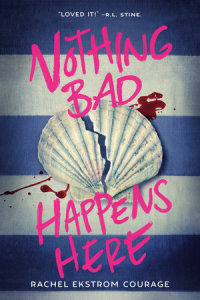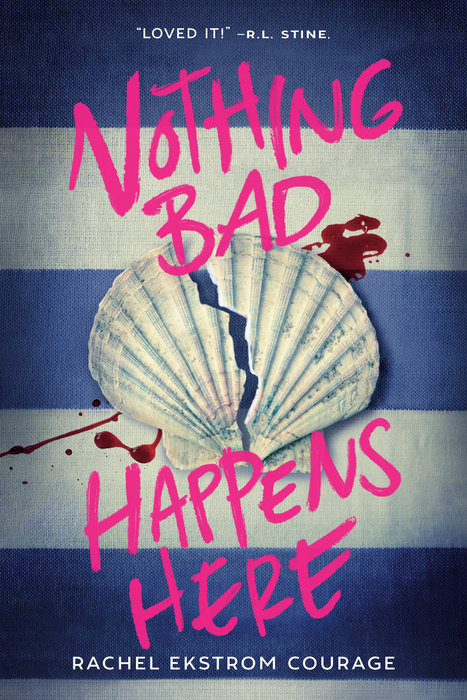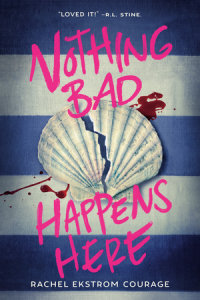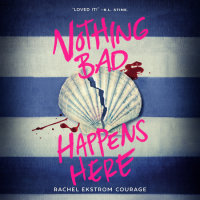Nothing Bad Happens Here
Author Rachel Ekstrom Courage
Sun, sand, and secrets...
“Part mystery, part thriller... and absolutely pitch-perfect! A summer in Nantucket you won’t forget!” —Sarah Beth Durst, New York Times bestselling author of The Lake House
A carefree New England vacation is just what sixteen-year-old Lucia needs to chase her sadness away. At least, according to her mom, who whisks them away for the summer with her ridiculously wealthy new boyfriend. Nothing bad happens in Nantucket, a charming island with cobblestone streets and million-dollar…
Sun, sand, and secrets...
“Part mystery, part thriller... and absolutely pitch-perfect! A summer in Nantucket you won’t forget!” —Sarah Beth Durst, New York Times bestselling author of The Lake House
A carefree New England vacation is just what sixteen-year-old Lucia needs to chase her sadness away. At least, according to her mom, who whisks them away for the summer with her ridiculously wealthy new boyfriend. Nothing bad happens in Nantucket, a charming island with cobblestone streets and million-dollar cottages.
But when Lucia stumbles upon the body of a teenage girl on a beach, the discovery reopens old wounds from her past. With the dead girl's identity a mystery, Lucia takes it upon herself to investigate and crosses paths with Selah and her pack of devil-may-care besties. The three girls are beautiful, chaotic, and a little wild—and they help Lucia forget her crushing sense of grief and loneliness. But as Lucia becomes a part of their shimmering world, she begins to suspect that there are dark secrets hidden in this quiet enclave, and that uncovering them may be the key to solving the dead girl’s murder. Not everything on this island is what it seems…
An Excerpt fromNothing Bad Happens Here
Chapter 1
I stood alone on the front deck of the ferry as it pushed through the fog. Everyone else was inside, including my mom, who had curled up on a window seat after our two-day drive. It was early June, and we’d left Pittsburgh in time to avoid the heat and humidity that would soon envelop the city. My mom had driven most of the twelve hours herself, only letting me behind the wheel on “easy” highways, and, in the time-honored tradition of mothers of teen drivers, flinched every time I changed lanes. Never mind that I was careful—more careful than she was. I didn’t put on eyeliner at red lights, or sip coffee, or change radio stations every five minutes like she did. I was still in that new-driver mode: hands at three and nine, checking my mirrors methodically and staying exactly five miles per hour under the speed limit.
Not that she noticed.
I pulled my hoodie tighter around my face as the mist thickened into a drizzle. The sea air smelled briny and fresh,…
Chapter 1
I stood alone on the front deck of the ferry as it pushed through the fog. Everyone else was inside, including my mom, who had curled up on a window seat after our two-day drive. It was early June, and we’d left Pittsburgh in time to avoid the heat and humidity that would soon envelop the city. My mom had driven most of the twelve hours herself, only letting me behind the wheel on “easy” highways, and, in the time-honored tradition of mothers of teen drivers, flinched every time I changed lanes. Never mind that I was careful—more careful than she was. I didn’t put on eyeliner at red lights, or sip coffee, or change radio stations every five minutes like she did. I was still in that new-driver mode: hands at three and nine, checking my mirrors methodically and staying exactly five miles per hour under the speed limit.
Not that she noticed.
I pulled my hoodie tighter around my face as the mist thickened into a drizzle. The sea air smelled briny and fresh, so much better than the rental car, which was stale with my mom’s perfume and the countless bags of pepperoni Combos we gobbled between rest stops. The ferry was a big boat—big enough for cars to park inside it—so it didn’t rock, but plowed steadily ahead into the grayish fog. In the cozy warm cabin of the boat, kids were munching Cape Cod potato chips and playing on tablets . . . but I pretended this was all there was: the mainland behind me and the island ahead of me. I imagined myself dissolving into the fog, my body becoming diaphanous, until I became one with the dark, damp nothingness.
A cold spray of seawater drenched the bottoms of my jeans, dragging me back to reality and its roaring soundtrack of wind and water. We must have hit a big wave. I peered through the fog, past the rusted metal side of the ship and into the yellow froth churning in its wake. My teeth chattered as the wind buffeted my face, making it feel like November instead of June, but I wanted to stay outside in the freezing wet wind.
I needed some distance from my mom.
For the latter half of my sophomore year, her parenting style had taken a sharp left turn from free-spirited benign neglect to a much more annoying hands-on approach, where she asked about my homework every night and no longer endorsed ice cream for dinner. Instead of talking about her string of boyfriends or fixating on her latest art project, she frequently asked about my feelings, my caffeine consumption, if I’d taken my vitamins, did I ever wish I had a dad in the picture since it had always been just us, if I wanted to see her acupuncturist, did I feel like I was spending too much time scrolling TikTok, and on and on. The long road trip had provided ample opportunity for her to grill me about my emotional state, and now—after hours of relentless prodding—I felt like a deflated balloon, unable to fill myself up again.
I leaned on the rail, resting my forearms against the cold metal, and gazed up at the waning, almost-full moon, its edges made milky and indistinct by the fog. My clothes were damp from the spray and the cold was biting, but I still couldn’t make myself walk back to the brightly lit cabin, where I imagined my mom was already primping for our arrival. I could practically hear her insisting that I “freshen up,” too—and maybe put on a nicer top from my duffel bag. She wanted me to make a good impression on Todd. After all, he was the reason we were headed to Nantucket, a place I’d never been. Most of my classmates went to summer camp in Ohio or drove to closer vacation spots like Ocean City or Deep Creek for long weekends with their families.
Sammi’s family was the exception.
They went to Maine for a month every year, to visit her grandmother and extended family at her cottage, which—judging from the pictures Sammi posted—was her family’s way of saying “estate.” Even though she always said I should come, her parents never extended an official invite . . . so Nantucket would be my first time in New England, my first time going anywhere for an entire summer, my first time meeting Todd in person, and my mom’s first time seeing him since their meet-cute at a coffee shop six months earlier. Todd had been in Pittsburgh for a real estate conference, and when he grabbed her decaf latte by accident, he apologized and asked her out to dinner that night. They went to dinner again the next day, and then he had to fly back to Nantucket. Since then, they’d spoken on the phone every night.
If my mom hadn’t been so laser-focused on me and my welfare these past few months, I bet she would have flown out to see him or asked him to come visit us. Even though their relationship was long-distance, it was obvious that it was serious from the hours they spent talking to each other.
I could always tell when my mom was on the phone with Todd because her voice climbed into a trilling register that she never used with me. Just a week ago, we’d made dinner and were about to settle on the couch to watch the Scandinavian crime show we were both obsessed with when her phone blared the opening notes from “Wouldn’t It Be Loverly” from My Fair Lady, her favorite movie. After FaceTiming with him in the kitchen for a few minutes, she’d passed the phone to me, her face pink and happy. I gave her a beseeching look and shook my head. I was already in my pajamas and had a mouthful of Mrs. T’s pierogies, the ideal comfort food.
“He wants to ask you something,” my mom said, smiling broadly. I swallowed and wiped my mouth. On the screen, Todd sat in a burgundy leather office chair flanked by shelves holding books and a small model ship. He pulled the phone closer, his head taking up the whole frame, and invited me and my mom to stay with him at his home in Nantucket through the end of August.
“Sun, sand, and fresh seafood,” he said. “You’ll love it.”
I pasted a pleasant expression on my face and stared over the edge of the phone at my mom, raising my eyebrows slightly. She of all people knew I avoided the sun like the plague and thought seafood was, well, gross, compared to all the other less stinky, land-based options.
She also knew that I didn’t like to leave the house these days.
“Just think, summering in New England, like Jackie O!” my mom said after Todd had signed off, trying to hype me up for this change of plans when she knew I’d much rather cocoon myself in my room and avoid humanity whenever I wasn’t forced to confront it at my library job. “It won’t be as muggy as it is here, and there are beaches, bike paths, and lots of conservation areas. We could even go whale watching!” She listed activities like a glossy brochure.
“That sounds terrifying,” I’d said, slumping on our ugly plaid couch. “And I’m an indoor cat.” Spring semester of my junior year had finally ended, and I’d thought that meant I wouldn’t have to force myself to do anything else I didn’t want to do—at least until the school year started again.
Just existing this past year had been challenging enough.
“When I was your age, I would have jumped at this chance. You couldn’t drag me out of the water,” my mom had said. She’d told me lots of stories about growing up on Lake Erie, most of which involved swimming, canoeing, and “making her own fun.”
“Then why do we live here?” I’d asked pointedly. We had three muddy rivers in Pittsburgh, none of which you’d catch me swimming in, and were completely landlocked in Western Pennsylvania.
“Well, I met your father here and, you know, life happened,” my mom said, sitting at the other end of the couch. As usual, she glossed over the surprise pregnancy (me), the hasty marriage, the even hastier divorce, and the fact that my dad now had another family in Nashville. We only heard from him on my birthday or at Christmas, but usually not both in the same year.
“Life happened” was my mom’s catchall for why she never remarried, why she stayed at her boring receptionist job (well, that and the health insurance), why she never moved to New York and never seriously pursued her interest in art.
She fixed me with her big brown eyes, making a pleading expression that wrinkled her forehead. She’d made that face a lot over the past year—begging for me to talk to her, to take a shower, to join her on a walk or on a trip to the grocery store. Once she’d dragged me to get manicures together, but I couldn’t bear it—a stranger touching my hands, plucking at my cuticles, at a salon where I could run into people who actually knew me. I’d tearfully left to wait in the car with a wet coat of Wicked on one hand and a base coat on the other, mortified by having a panic attack in public. So why did she think I could do this?
But after springing our new summer plans on me, instead of saying that we didn’t have to go if I didn’t want to, she’d perched next to me on the couch.
“I really like Todd,” she said, fiddling with a slim cable-edged bracelet on her wrist that he’d sent her. “He could be The One. Maybe. I don’t know. But spending a whole summer together, with all of us under one roof, is how I’m going to find out. And it will be good for you, too.”
She hadn’t said that we didn’t get to go on vacation very often. That maybe she needed a break from the life we had here. That she deserved to have some fun, beyond working and taking care of her daughter whose melancholy had leaked like a toxic spill into every corner of our two-story house. I knew there was no point in asking why she needed Todd—what’s wrong with it just being us, like it’s always been? I already knew the answer. Like a drowning person, I threatened to drag her with me to the murky depths.
“The change of scenery will do wonders for you,” she’d said, fluttering her hands in our dim living room. “The fresh air, the ocean . . .” Her face lit up. She loved talking about the future. How everything would be better once the sun came out, once this thing or that thing happened. Her optimism made her lovable—but it could also be infuriating.
“The curative powers of sea air,” I’d joked, poking her playfully in the arm. I hadn’t seen that sparkle in her eyes for a while, and I didn’t want to snuff it out. “You make me sound like a Victorian invalid.”
“Well, you’re starting to look like one,” she’d said, smoothing lank, unbrushed hair back from my face. “And you know I say that with love. Plus, you’re my kid, and you don’t have a choice.”
“Well then,” I’d said. “A Victorian invalid summer it is. Sign me up for bloodletting, preferably with leeches.”



